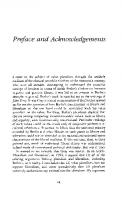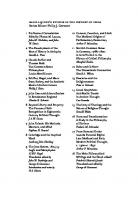Liberalism and Value Pluralism 9781474213097
Value pluralism is the idea, associated with the late Isaiah Berlin, that fundamental human values are irreducibly plura
237 41 14MB
English Pages [277] Year 2002
Recommend Papers

- Author / Uploaded
- George Crowder
File loading please wait...
Citation preview
Preface and Acknowledgements
I came to the subject of value pluralism through the unlikely medium of the classical anarchist thinkers of the nineteenth century, who were all monists. Attempting to understand the anarchist concept of freedom in terms of Isaiah Berlin's distinction between negative and positive liberty, I was led to an interest in Berlin's thought in general. Berlin's work in turn led me to the writings of John Gray. It was Gray's critical interpretation of Berlin that opened up for me the question of how Berlin's commitment to liberty and liberalism on the one hand could be reconciled with his value pluralism on the other. For Gray, Berlin's pluralism implied that choices among competing incommensurable values, such as liberty and equality, were fundamentally non-rat~onal.Particular rankings of such values could be the result only of subjective preference or cultural inheritance. It seemed to follow that the universal priority accorded by Berlin and other liberais to such goods as iiberty and toleration could not be defended in the rational and universal terms characteristic of the liberal tradition. If this was true, then, as Gray pointed out, much of traditional liberal theory was undermined, indeed much of conventional political philosophy. But was it true? It seemed to me initially that Gray was correct. In an article, 'Pluralism and liberalism', in 1994, I argued thar (I) all of the existing argumenrs linking pluralism and liberalism, including Berlin's, were faulty. I concluded that (2) value pluralism does not support liberalism, and more speculatively that (3) pluralism positively undermines any rational case for liberalism. My argument vii
CHAPTER 1
Introduction
This book is a defence of liberalism on the basis of value pluralism.1 Some recent theorists have argued that if values are plural in the relevant sense, then the traditional claim of liberalism to represent the best political order universally must be rejected. Under value pluralism, these theorists claim, desirable political forms vary along with local traditions or the demands of political pragmatism. I shall argue that this view is mistaken, and that if value pluralism is true, then we ought, so far as practicable or prudent, to endorse a liberal form of politics universally. Moreover, we ought, with the same proviso, to support a strong form of liberalism that is 'perfectionist' in the sense that a liberal state should promote liberal forms of the good life. A liberal state should accommodate many such forms, but should not attempt to be wholly neutral among conceptions of the good. Finally, pluralist liberalism will be redistributive and moderately multicultural, and is likely to temper democracy with constitutional safeguards. In this introductory chapter, I lay our the basic question for liberalism raised by value pluralism, sketch my answer to that question, and indicate the main steps by which I construct my argument.
1.1 The Problem
I begin by offering a preliminary account of value pluralism,
CHAPTER 2
Liberalism and its Justification
It is only when we have some grasp of the general terrain of contemporary liberal theory that we shall be in a position to see how value pluralism bears on that theory. In this chapter I give an account of what liberalism is, why it needs to be justified and how that justification is usually attempted. I engage here with a huge literature which cannot, of course, be treated comprehensively in a single chapter. My purpose is to provide a context of debate for my more specialized arguments regarding value pluralism, and to introduce certain concepts, questions and themes which I shall refer to in those arguments. I present the main contemporary strategies for the justification of liberalism as turning on two debates, first between universalist and particularist approaches, second between neutrality and perfectionism. The principal positions in liberal theory can be understood as permutations of these views: universalist neutrality, particularist neutrality, universalist perfectionism, particularist perfectionism. I argue that the debate among these rival approaches to liberalism has reached something of an impasse. All these views exhibit strengths and weaknesses, and it is hard to conclude that any has a clear edge over its competitors. Later, in Part 111, I shall ask whether a valuepluralist approach might break the deadlock.
CHAPTER 3
Value Pluralism
In this chapter I develop the account of value pluralism outlined in Chapter 1. The analysis offered is not intended to be comprehensive or to enter deeply into the many controversial and difficult questions that the idea of pluralism raises. My purpose is merely to lay out the basic materials, and to open up some of the fundamental issues, to which I shall refer when I come to the political matters that are my main concern. My discussion is divided into three sections. First, I look more closely at the meaning of value pluralism by examining the four elements outlined earlier: universal values, plurality, incommensurability and conflict. I shall pay most attention to incommensurability as the most distinctive and complex of these. Second, I consider the ethical implications of value pluralism, asking how we can choose rationally among plural values when they conflict. I shall argue that pluralism implies two kinds of ethical guideline. The first is particularist: at the level of particular cases it is possible to choose rationally among conflicting plural values by reference to the context of the choice, which may include a background conception of the good. The second is universalist: at a more abstract level, the formal features of pluralism itself suggest ethical norms that apply across a generality of cases. Both universal and particularist approaches will contribute to my case for liberalism. Finally, I review some of the arguments for the truth of value pluralism. How persuasive is the claim that values are plural and incommensurable in the sense described? Here I shall argue that although the truth of
CHAPTER
4
From Pluralism to AntiUtopianism: Berlin's Case
I now embark on the question of pluralism's political implications, in particular its implications for liberalism. In Chapter 1, I considered and rejected two attempts to argue from value pluralism to liberalism. In this chapter I examine the original and best-known pluralist case for liberalism, that of Isaiah ~ e r l i n . 'Berlin's classic 'Two concepts of liberty' contains two main lines of argument from pluralism to liberalism. First, his more explicit argument is that pluralism gives us a reason to value choice, hence the freedom of choice emphasized by liberals. I argue that this claim, as Berlin states it, is unsuccessful. A second argument, implicit in Berlin's project as a whole, is more convincing. This is that the pluralist outlook, especially in its emphasis on value conflict and incommensurability, requires an 'anti-utopian' approach to politics. For pluralists, political schemes that aim at the harmonious realization of all human goods must be repudiated. Consequently, pluralist anti-utopianism involves the rejection of certain traditional rivals to liberalism, namely classical Marxism and anarchism. Pluralists are committed to a form of politics that accepts conflict and hard choices as permanent features of human experience that must be coped with rather than transcended. Liberalism answers to this requirement. But so, too, on the face of things - do conservatism and pragmatism. Berlin takes us from pluralism to anti-utopianism, but this is not yet a complete case for liberalism. I begin by reviewing Berlin's argument for the value of choice before turning to the central theme of his pluralist anti-utopianism.
CHAPTER 5
Pluralism against Liberalism? Consermatism and Pragmatism
In Chapter 4 I endorsed Berlin's claim that value pluralism implies anti-utopianism, but conceded that anti-utopianism alone is consistent with non-liberal forms of politics, namely conservative and pragmatic positions. I shall now argue that conservatism and pragmatism should be eliminated from a pluralist point of view. I show this by examining the arguments of two writers who purport to take value-pluralist premises to conservative or pragmatic conclusions: Kekes and Gray. The 'anti-liberal pluralists', as I call them, emphasize the extent to which rational choice among competing plural values is possible only in context. It follows, they say, that the standard universalist justifications of liberalism should be rejected. Liberalism should be either dismissed altogether or at least recognized as no more than one legitimate option among others. Rather, pluralist particularism suggests that basic values can be ranked only by taking local tradition a s authoritative or by reaching a pragmatic modus vivendi among rival ways of life. Pluralism, that is, implies not liberalism but conservatism or pragmatism. I argue that pluralist anti-liberalism should be rejected. In the first section I show that Kekes's conservative view rests on the assumption that pluralist particularism requires deference to local tradition. 1 Even if this were true, pluralism would support liberalism in cases where the local tradition happened to be liberal. But in any case, Kekes's traditionalism is an unduly narrow interpretation of 'context'. A wider notion of context lets in a wider
CHAPTER 6
From Pluralism to Liberalism IDiversity
The encounter with anti-liberal pluralism has shown not only that a case for liberalism is compatible with value pluralism, but also that pluralism itself can provide a foundation for liberalism. So far as pluralism directs our attention to context, the context in question may be one that favours a distinctively liberal ranking of goods. W e have also seen, however, the limitations of this particularist way of arguing for liberalism. The question then arises, might pluralism generate a case for liberalism that is not merely particularist but universal? I have already indicated the possibility of such a case: pluralism itself implies a set of normative criteria for rational choice among competing values. So far I have noted two of these: respect for universal values, and recognition of the imperfectibility of human life implied by value incommensurability. These two principles, I have argued, together rule out from a pluralist perspective certain rivals to liberalism, namely utopian, conservative and pragmatic forms of politics. But they do not yet amount to a positive justification of liberalism. The construction of such a universal justification of liberalism on the basis of value pluralism is the task I now commence. In this chapter I set out the first of my three principal arguments from pluralism to liberalism, namely an argument based on the value of 'diversity'. I argue that the list of general principles implied by pluralism includes an ethic of diversity, corresponding in particular to the pluralist conception of the plurality of goods. Roughly speaking, pluralist diversity commits us to promoting as wide a
CHAPTER 7
From Pluralism to Liberalism IL Reasonable Disagreement
In the previous chapter I argued that value pluralism generates a case for liberalism on the ground of diversity, principally of goods and secondarily of ways of life. In this chapter I construct a second argument from pluralism to liberalism, this time making the accommodation of a diversity of ways of life the principal focus. The argument here is based on the notion of 'reasonable disagreement'. My central claim is that if value pluralism is true, then we must accept that many (although not all) disagreements about the nature of the good life will be reasonable, and therefore that the state ought to accommodate such disagreements rather than attempt to eliminate them. The best political vehicle for accommodating disagreement about the good life is liberalism. This argument can be brought into sharper relief by critically comparing it with Rawls's 'political' case for liberalism. As we saw in Chapter 2, Rawls's later political reformulation of his theory of justice is perhaps the most sophisticated, certainly among the most influential, of justifications of liberalism along neutrality lines. Rawlsian political liberalism thus provides a challenging standard against which to assess the contribution made by my pluralist case to the defence of liberalism. More specifically, I shall focus on a distinctively Rawlsian objection to attempts like mine to base liberalism on value pluralism. Charles Larmore has argued that pluralism cannot ground a case for liberalism as neutral among conceptions of the good because pluralism is itself a controversial conception of the good (1996: Chapter 7). Larmore seeks to draw a
CHAPTER 8
From Pluralism to Liberalism 111-Virtues
In this chapter I set out the third of my principal arguments from pluralism to liberalism. The first was the diversity argument, the second the argument from reasonable disagreement. Both of these imply a case for liberalism that is accommodationist in character: liberalism is justified along these lines as approximately neutral among different conceptions of the good. I shall now argue that pluralism also implies a case for liberalism as the best political vehicle for the development and practice of certain 'pluralist virtues' 1 or traits of character, in particular personal autonomy. My basic claim is that these are virtues required for practical reasoning under pluralism, and that they are best promoted by a liberal form of politics. O n this view, liberalism becomes not only a political framework for a society containing diverse and conflicting conceptions of the good life (Chapters 6 and 7), but also an ethical framework for those conceptions themselves. This virtues-based argument consequently suggests a form of liberalism that is broadly 'perfectionist' rather than neutralist, that is, based on a conception of the good which it is the legitimate business of the state to protect and promote. A question then arises as to the relation between this approach and that of the previous two chapters, since the two appear to be in tension, but I shall postpone that issue until the next chapter (9.1). My discussion is divided into four sections. First, I give an account of the virtues required for reasoned choice making under pluralism. Second, I show how those virtues are promoted by
CHAPTER 9
Pluralist Liberalism
I have argued that value pluralism supports a case for liberalism by way of three main routes. First, pluralism implies a commitment to diversity that is best satisfied by the approximate neutrality of which liberalism is capable. Second, this relative neutrality also meets the pluralist requirement that the desirable political system accommodate reasonable disagreement among conceptions of the good. Third, to engage successfully in practical reasoning in the light of pluralism requires a certain set of virtues, most notably a strong form of personal autonomy, which again flourish best in a liberal political order. My question in this chapter is, what kind of liberal order will this be? First, I consider its general character in terms of the categories established in Chapter 2: univeralist or particularist, neutralist or perfectionist? I argue that while pluralist liberalism is clearly universalist in character, the issue between neutrality and perfectionism is more complex, since pluralism generates both kinds of justification for liberalism. While the arguments from diversity and reasonable disagreement point to a neutralist conception of liberalism, the virtues-based argument suggests a perfectionist view. My conclusion, however, is that although the accommodation aspect remains important, the perfectionist strand takes priority. Pluralist liberalism is broadly universalist and perfectionist in outlook. Second, having captured the general tenor of pluralist liberalism, I consider its implications for two major areas of public policy: economic distribution and cultural rights. I argue
CHAPTER 10
Conclusion
I have tried in this book to steer a course between the inadequacy of past attempts to argue from pluralism to liberalism and the precipitancy of recent claims that deny the possibility of such an argument altogether. On the one hand, the claim that value pluralism endorses liberalism has often been simply assumed to be true, or else supported by arguments that collapse on inspection. In some cases the argument turns out to be based not on Berlinian value pluralism at all but rather on de facto plurality of belief, which is in any case consistent not only with liberalism but also with its denial. A more sophisticated version of the argument from plurality of belief is presented by Rawls, but this works only to the extent that it depends on an implicit appeal to value pluralism after all. When value pluralism is taken as the explicit starting point, the results are often no better, as in the 'argument from indeterminacy'. There, pluralism is mistakenly said to yield a radical or unrestricted indeterminacy, which again cannot justify liberalism anyway. The arguments sketched by Berlin, too, are flawed or limited in the form in which he presents them. The failure of these arguments does not, however, mean that no route from pluralism to liberalism is navigable, still less that pluralism rules out the reasoned justification of liberalism. The recent pluralist critics of liberalism are no less mistaken than the liberals they criticize. At their most extreme, the anti-liberal critics interpret pluralism as implying that there can be no reason to justify liberal rankings ahead of others because choices among conflicting









